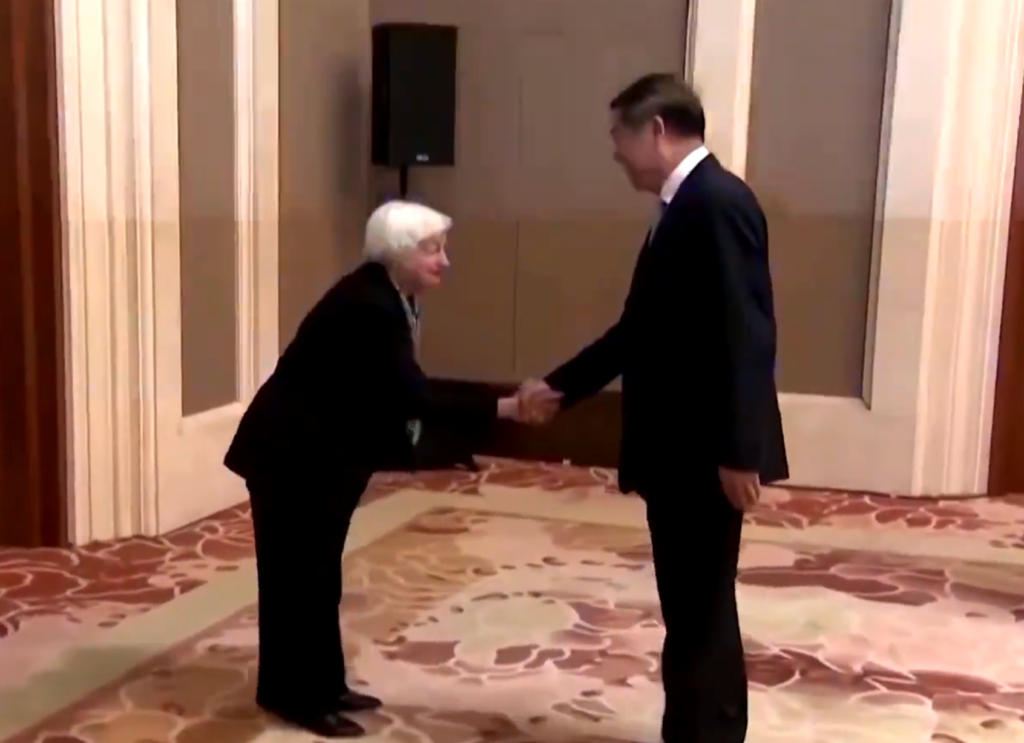Secretary of the Treasury Janet Yellen was dispatched to Beijing by the White House to meet with high-ranking Chinese officials. She follows in the footsteps of Secretary of State Antony Blinken.
Like the Blinken mission, there were no advance announcements of any deliverables – agreements, breakthroughs or specific concessions by China. The Blinken mission lived up to its progress free billing. The United States got nothing from China. Nothing on the spy facility in Cuba or “police stations” in the United States. No secession of provocative military “close calls.” No accountability on the Covid Pandemic. No relinquishment of claims over the China South Sea. No termination of unfair trade practices. No restoration of direct military communication. No help with the Ukraine war. No nothing
On the other hand, China got a psychological benefit by having Blinken supplicate the United States to a humbling visit. President Xi Jinping also got Blinken to oppose independence of Taiwan and to confirm to the world that Taiwan belongs to China under America’s One China policy – a policy widely recognized throughout the world. Blinken declared the issue of the Chinese spy balloon to be closed. No consequences.
Now cometh Yellen.
The most common media expression as Yellen landed in the Middle Kingdom was “low expectations.” Since her stated mission was to assure China that the United States does not wish to “decouple” the relationship, we can assume that there would be no harsh measures for China’s bad behavior in many sectors. There was a stated hope of restoring warmth to the increasingly chilly relationship. How that would be achieved – and what evidence we might see – is a mystery. It seems more of a baseless hope – a throw-away line – rather than a real achievable goal.
Now that the Yellen trip is history, we can safely say that nothing appears to have been accomplished. She had more than 10 hours of discussions with Chinese Premier Li Qiang and Vice premier He Lifeng.
The most significant announcement was Yellen’s commitment to the Chinese/American trade relationship. She said that the United States has no intention of “decoupling” from the current status quo. She said that decoupling would have devastating impact on both China and the United States, as well as the world economy – and be “virtually impossible.” Sounds like that means no significant consequences for the various actions by China to which the United States takes exception. Nothing beyond toothless verbal complaints.
That conflicts with one of the other issues Yellen said she brought up. We would take “targeted actions” to protect the national security interests of the United States — but we would be considerate of China’s concerns about any unintended consequences of our actions”.
She told the Chinese that America was “very concerned” about China’s treatment of American companies’ intellectual property and access to the Chinese market. Those are the same issues which “concerned” the United States when I started going to China on business in 1999.
Yellen said she urged China to increase its funding of climate change issues. No commitment from China on that one.
Yellen left China saying that the world was big enough for both nations to thrive – and she does not view the China/US relationship as a great power struggle. That might be a good thing, but only if the other side sees it the same way – which China clearly does not.
Yellen conceded that there was no consensus on any of the key issues. But she HOPED that her visit would help build a beneficial channel of communication between both sides. Unfortunately, that channel of communication is a one-way deal. We express concerns and hope, and the Chinese ignore our concerns and dash our hopes.
We have a range of issues with China – trade practices, intellectual property, commercial espionage, increased spying, support for Putin’s invasion of Ukraine, territorial claims to the South China Sea and the Straits of Taiwan, the construction of military islands in the South China Sea and a potential invasion of Taiwan, to name a few. The Yellen and Blinken visits did not gain a single consideration – much less a concession – from China.
NATO is not as hesitant to call out China. In a communique produced at the NATO summit in Lithuania, the Alliance said that China’s “stated ambitions and coercive policies challenge our (NATO’s) interests, security and values.” They accused China of employing “a broad range of political, economic, and military tools to increase its global footprint and project power, while remaining opaque about its strategy, intentions and military build-up,”
The world was watching and unfortunately, the Yellen and the Blinken trips signal weakness on the part of the United States – as did President Biden’s humbling trip to Saudi Arabia to beg for oil. It was the first bump seen around the world. All three missions were failures.
Yellen also committed a diplomatic boo-boo. She has a habit of bobblehead bowing in discussions with Chinese leaders. While the western culture may see it as a nothing burger, Asian cultures give great meaning to the kowtow. It is a sign of supplication and weakness. She did it upon her arrival, but it was most significant when dealing with high level Chinese officials – who did not bend or bow in return. Those optics were very bad for the United States.
Like Blinken’s trip, the Yellen junket was said to be setting the stage for the anticipated meeting in Beijing between President Biden and President Xi. We can only hope that apart from all that empty rhetoric coming out of the Blinken and Yellen meetings, there was some private discussion that will lead to a more productive visit by Biden. Or will he follow suit and express our concerns without any concession on the part of China? Stay tuned.
So, there ‘tis.
